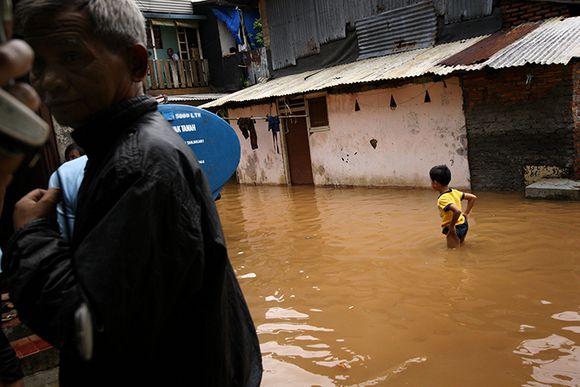
Access to clean water is difficult. With seasonal flooding, both the Ciliwung river and groundwater from the many hand-pumps become increasingly contaminated.
Henri Ismail
In Cipinang Muara, East Jakarta, there lies a cemetery complex known as ‘Kuburan Cina’. It is not, unfortunately, solely a resting place for the deceased. It is also home to over 80 families living in a slum inside the complex where water is a precious commodity. The people here earn their income from selling goods in a nearby flea market, making just Rp20,000 (US$2.60) a day. Buying clean water from private vendors is clearly not an option for them. Likewise, piped water is too expensive, and the city’s private water operators do not offer their services to what they consider illegitimate houses. In the past, the slum residents obtained water for cooking, drinking and sanitary purposes by collecting rainwater from the roofs of the buildings in their neighbourhood. Two years ago they collaborated to install four shallow wells. Given the quality of water they use however, water borne diseases such as diarrhoea and typhoid are not uncommon.
The story from Kuburan Cina is a stark reminder of the water service predicament in Jakarta and particularly its impact on the city’s urban poor. When a new system of Private Sector Participation, or PSP as it is sometimes known, opened up the city’s water supply sector to private companies in February 1998, it was hoped that Jakarta would finally be relieved of its clean water shortage woes. However, eight years later a UNDP report found that over 75 per cent of Jakartans – most of whom are of the poorer segment of the population – were still without improved access to clean water, relying instead on multiple sources, including rivers, lakes and private vendors.
Jakarta is in dire need of a functioning water supply system that can allow the city’s burgeoning population to stop relying on contaminated underground water
In the same year, however, Jakarta’s environmental body reported that approximately 85 per cent of the shallow underground water in the city had been contaminated by faecal coli bacterium resulting from human waste, causing those who consume it to be infected by water borne diseases. In light of these statistics, there is little doubt that Jakarta is in dire need of a functioning water supply system that can allow the city’s bourgeoning population to stop relying on the contaminated underground water. Unfortunately, to date the participation of private companies in the distribution and maintenance of Jakarta’s water supply seems to have done more harm than good.
Inside Indonesia for more
